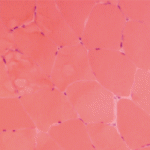Referral & Ongoing Care
Although rheumatologists are typically comfortable with the diagnosis and treatment of inflammatory myopathies, if a metabolic myopathy is suspected, referral to a metabolic neurologist is indicated. There, more specialized diagnostic tests can be performed. If a rheumatologist has strong clinical suspicion of a structural myopathy, referral to a neuromuscular neurologist would also be prudent. In both cases, these specialists may be better suited performing some of the specific, second-line tests involved in diagnosing these rare conditions.
Dr. Tarnopolsky recommends patients diagnosed with metabolic myopathies be treated at a specialty center in a major academic institution, because the treatment is highly disease specific, and new treatments are always emerging. A few of the metabolic myopathies have established specific treatments, such as enzyme replacement therapy for Pompe disease or riboflavin for MADD (multiple acyl-CoA dehydrogenase deficiency). Specially tailored exercise therapy also seems to benefit many patients, and depending on the condition, specific dietary plans can help.4,5
But for the most part, treatment centers on helping patients avoid disease triggers and prevent rhabdomyolysis. Rheumatologists can play an important role in identifying the patients at risk of this potential serious complication due to an undiagnosed metabolic myopathy.
Ruth Jessen Hickman, MD, is a graduate of the Indiana University School of Medicine. She is a freelance medical and science writer living in Bloomington, Ind.
References
- van Adel BA, Tarnopolsky MA. Metabolic myopathies: Update 2009. J Clin Neuromuscul Dis. 2009 Mar;10(3):97–121.
- Berardo A, DiMauro S, Hirano M. A diagnostic algorithm for metabolic myopathies. Curr Neurol Neurosci Rep. 2010 Mar;10(2):118–126.
- Olpin SE, Murphy E, Kirk RJ, et al. The investigation and management of metabolic myopathies. J Clin Pathol. 2015 Jun;68(6):410–417.
- Tarnopolsky MA. Metabolic myopathies. Continuum (Minneap Minn). 2016 Dec;22(6, Muscle and Neuromuscular Junction Disorders):1829–1851.
- Finsterer J. An update on diagnosis and therapy of metabolic myopathies. Expert Rev Neurother. 2018 Dec;18(12):933–943.
- Quinlivan R, Jungbluth H. Myopathic causes of exercise intolerance with rhabdomyolysis. Dev Med Child Neurol. 2012 Oct;54(10):886–891.
- Smith BW, McCarthy JC, Dawley CA. Suspect myopathy? Take this approach to the work-up. J Fam Pract. 2014 Nov;63(11):631–638.

